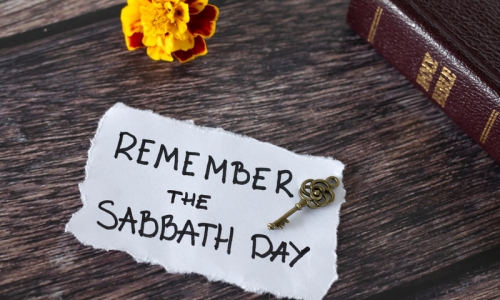In Part 1 of this article, I shared how our family’s journey into Sabbath began not from peace but from pain—a season of heartbreak with our son that drove us to prayer and fasting. Yet soon after we began setting aside a weekly Sabbath dinner, we noticed his countenance start to change. This simple act of obedience—honoring the Sabbath—became the catalyst for healing, peace, and joy in our home, leading to breakthroughs and restoring connection we hadn’t even realized we’d lost.
During that season, the Lord whispered a phrase to my heart that would change everything: “You tapped into the hidden power of Shabbat.” Now, in Part 2, we’ll explore what it looks like to practice Sabbath in daily life—and how you, too, can experience its hidden power. Let’s begin by laying a foundation for why we need a weekly Sabbath.
There are certain aspects of our personal faith journey that will be unique to us, whether we honor Sabbath was not meant to be one of the optional things. In a world that idolizes productivity, Sabbath is an act of rebellion against the busyness and distraction that regularly assaults us. In Chinese, “busyness” is written with two characters: heart + killing. Busyness literally kills the heart. As Dallas Willard counsels us,
“Hurry is the great enemy of spiritual life in our day. You must ruthlessly eliminate hurry from your life.”
Psalm 127:2 reminds us, “It is in vain you rise early and stay up late, eating the bread of anxious toil, for He gives His beloved sleep.” Anxious toil is work done apart from God, me trying to establish my own significance.
Sabbath is not a reward for hard work; it is a gift that precedes work and enables us to work. It is the FIRST day of the week, not the last. We don’t rest only when we are finished with our “to do” list. If this is necessary, then your work is ruling and reigning over you and not the other way around. Eugene Peterson admonishes us,
“If you don’t take a Sabbath, something is wrong. You’re doing too much. Quit one day a week and watch what God does when you’re not doing anything.”
When we honor the rhythm He established for us at the beginning of time, we surrender control over our lives and depend on His ability to both provide and redeem the time we give Him. So, Sabbath is really about trust.
“A good definition of Sabbath is imitating God so that we stop trying to become God.” -Mark Buchanan
Sabbath is supposed to redefine our relationship to work and rest and reorient our identity. We rest because God did, and since we are made in His image, we are afforded the divine dignity of rest. In a culture that says: You are what you do, earn, or produce, Sabbath says: You are beloved because you are God’s child. Pastor and author Tyler Staton asks an important question,
“In a culture where most of us work too hard, are under rested, discontent, sleep-deprived, busy, bored, or consumed with a fear of missing out – are we too distracted to be present? Or are we aiming to be a community of rest in a culture of exhaustion?”
But the real question is, do we even want to get well (John 5:5-6)? We oppose physical sickness without hesitation, but why is it we resign ourselves to sickness of our soul . . . even celebrate the habits that got us there? Mark Buchanan guides us on how to identify when there is a problem . . .
“One measure of whether you are rested enough is to ask yourself: How much do I care for the things I care about? When we lose concern for people, both the lost and found, for friendship, for truth and beauty and goodness: when we cease to laugh when our children laugh (and instead yell at them to quiet down); when we hear news of trouble among our neighbors and our first thought is that we hope it isn’t going to involve us – when we stop caring for the things we care about – that is a signal that we are too busy.”
I have lived through seasons of burnout, times when I felt overwhelmed with the demands of work and life that I stopped caring about the things that were normally important to me. I have been so overextended and emotionally exhausted to the point I felt I had nothing left to give, no energy for my spouse, deep conversations with friends, or even the desire to go to church. I was experiencing the bad fruit of overworking, and it became a wake-up call for me. John Mark Comer puts it simply,
“If the devil can’t get you to sin, he will get you busy.”
The devil distracts; God interrupts - we must pray for discernment to know the difference. And this is why we desperately need the Sabbath – a quieting to drown out all competing voices and distractions so His voice can guide every detail of our life. Sabbath is meant to be an assault on the world’s demands, an opportunity to recalibrate . . . to embrace what truly nourishes our soul amid these tough seasons. It is both a time and a perspective, a sacred TIME to slow down and rest our bodies and a SOUL SURRENDER that releases peace amid life’s many concerns (Matthew 11:28-29). Sabbath is God’s protection from burnout, and it is more about BEING than DOING.
Isaiah 58:13-14 tell us, “If you call the Sabbath a delight… then you will find your joy in the Lord.” Sabbath is both a refusal and a pursuit: we refuse to go our own way AND yet we pursue our own joy. The Rabbi and Jewish theologian Abraham Joshua Heschel writes,
“Sabbath is a palace in time where we delight in God, life itself, and the people who are most important to us.”
Now that you know WHY we need the Sabbath, HOW can we implement this into our lives today?
The Simplicity of Sabbath
Jesus completely blew off the Pharisees’ Sabbath rules . . . which begs the question, does God have any Sabbath rules, or did we make them all up ourselves? It turns out that God gave only broad and general prescriptions for the Sabbath – Rest, Remember, and Keep it Holy (Exodus 20:8-11, Isaiah 58:13–14). Pete Scazerro simplifies it into four practical movements that I think are helpful: Stop, Rest, Delight, and Contemplate.
1. STOP – Shabbot is a Hebrew word that means to STOP
Sabbath is a 24-hour period in which we stop work (and thinking about work), stop hurry, physical exhaustion, multi-tasking, competitiveness, worry, striving, decision making, errands, cleaning, shopping, technology and machines, etc.
“My whole life I have been complaining that my work was constantly interrupted, until I discovered the interruptions were my work.” - Henry Nouwen.
Sabbath has never been about following a rule but rather receiving a gift . . . a liberation from our slavery. When we embrace work that God has removed, we are enslaving ourselves to the Pharoah He set us free from! (And we should be careful not to enslave anyone else with such demands either).
We aren’t meant to always rush around trying to get more done, anxiously pressing and straining, distracted and filled with worry. Sabbath is meant to slow our pace - cease our drive to produce. It’s a day to find identity outside of what I accomplish. And this day grows into an attitude and a lifestyle. It is an act of worship when our perceived control is exchanged for rest. Though physical rest is important, in the end, our true strength comes from how well we are resting in Christ.
To redeem time, you may just have to waste it. The Sabbath calls us to build the doing of nothing into our schedules each week. Nothing measurable is accomplished. By the world’s standards it is inefficient, unproductive, and useless . . . but we are citizens of another kingdom with a different standard (Philippians 3:20, Ephesians 2:19).
Become generous with your time - slow your pace to be fully present to those around. As one theologian stated, “To fail to see the value of simply being with God and doing nothing is to miss the heart of Christianity.” We should strive to be like Mary, who knew she wasn’t wasting her expensive ointment on Christ (John 12:3-8).
PRACTICAL APPLICATION:
- Choose a 24-hour block to experiment with Sabbath. Don’t overcomplicate—simply stop working and start trusting.
- Create a stop list: activities you will NOT do on Sabbath (work emails, errands, shopping, scrolling). Don’t let the drive for perfect prevent you from getting started - God does not despise small beginnings (Zechariah 4:10).
- Journal one area of life where you try to “be God” (control outcomes, push productivity) or identify your idols (work addiction, phone, approval, money). Commit to release it weekly.
2. Rest – For your Body and Soul
What makes you more present and grateful to your life as it is? Nap, read, walk, enjoy creation - do whatever replenishes you.
We are nonstop human beings, when we aren’t nonstop with work, we are often nonstop with recreation. Sadly, it often takes physical illness to get us to stop and rest – I even remember once wishing I had the flu so I could just sit on the couch and cease working through my endless to-do list.
COVID was a huge reset of forced rest upon us, but God never intended us to need an international epidemic for this – He freely gives us this gift each week. Sabbath is like receiving the gift of a heavy snow day every week. Stores are closed and suddenly you don’t have any obligations or responsibilities- you have permission to take a nap and spend quality time with the family without guilt.
PRACTICAL APPLICATION:
- Enforce a digital detox – 24 hours tech free. Pray for how to implement this. Maybe you ease into it with just half a day off initially, or you allow limited times for important text communication but block other applications on your phone.
- Invite God’s healing by asking: “Lord, what burden do You want to lift today?”
- Put away your “to do” list and make a “what brings me joy” list.
3. Delight – Feast, Laugh, Play, Enjoy Family and Friends
Six days we create, the seventh we step back and enjoy creation (let created things bless and serve us). If cooking, exercising, gardening, or playing cards gives you rest and recreation, it is an allowable Sabbath activity.
Adulthood is mostly about getting things done: chores, responsibilities, obligations. The first thing to die is playfulness. Could it be that one of the things Jesus meant when he told his disciples to be childlike was that they should play more (Matthew 18:3)?
Chronos refers to quantitative, measurable time, like seconds and minutes, while Kairos signifies qualitative, meaningful moments that hold significance beyond mere duration . . . sanctified time. The death of play spells the conquest of Chronos time over Kairos time. Do I want to hand the god of utility that much territory?
When was the last time you took an entire day just to play?
You have permission from God to do this every week; however, it is important to remember there is an element of holiness to our Sabbath play. One of the largest obstacles to true Sabbath-keeping is leisure, what Sabbath becomes when we no longer know how to sanctify time. Eugene Peterson says we trivialize and secularize Sabbath if we think of it merely as a “day off.” Peterson coined the term, “bastard Sabbath,” when Sabbath becomes mere entertainment without sacredness. Sabbath bereft of the sacred is merely vacation (literally vacating) and it can be utterly unsatisfying. Fleshly indulgence occurs when we attempt to satisfy our soul’s cravings by what we can reach and grab for ourselves. But Sabbath is not about indulgence, but rather the GIFT of rest and play . . . allowing God to satisfy our desires.
PRACTICAL APPLICATION:
- Prioritize playing together: light a bonfire, swim in the ocean, play board games, do a puzzle, or watch an inspirational movie together. Do what feeds your soul.
- Think about ways to welcome God into your play: listen to worship music, read an inspirational book, invite someone to join you who also needs a day of rest/play, or get out in nature where you can acknowledge the wondrous works of our Maker.
- Share a favorite meal with family or save special desserts to savor only on this day each week to make it special.
4. Contemplate – Worship, Gratitude, Scripture, Prayer, Communion
Contemplation is the primary way we can sanctify our Sabbath as Kairos, time poignant with purpose and meaning. Some people, in their overworked exhaustion, long for a few moments just to “check-out” mentally with Netflix or Instagram, but that is not the type of rest that rejuvenates. Sabbath is meant to be more than just disconnection from our responsibilities.
Most of us know what it is like to be in a room full of people and still feel alone, to be forced into meaningless small talk among strangers, no room for safe authenticity . . . the type of connection that drains. From day one, God created us for connection that nourishes: connection with God, connection with others, and connection with ourselves. It takes all three of these for wholehearted living, and Sabbath is an opportunity to nurture such sacred connection.
Sabbath is meant to be a sacred intersection of connection—where we learn from God and from one another, sharing openly, encouraging deeply, and resting in the kind of safe, soul-nourishing fellowship our hearts were created for . . . a holy meeting place where heaven and community touch. If we don’t disciple our children, the world will, and Sabbath gives us an opportunity to weave faith into family conversations on a regular basis.
One of the best ways to embody God-ward orientation is thankfulness. God’s world, His character, His presence are always hidden from the thankless. To give thanks in all things trains us to be aware of God’s sovereign goodness. We practice the presence of God through thankfulness until we are utterly convinced of His goodness and sovereignty, until he is bigger, and we can find rest in Him alone.
In Jewish tradition, it was even considered a sin to be sad on Sabbath—not because grief is wrong, but because joy is a spiritual discipline. God calls us to choose life (Deuteronomy 30:19) and Sabbath gives us an opportunity to nurture joy through the practice of gratitude.
PRACTICAL APPLICATION:
- Share gratitude prayers on Sabbath. Instead of asking prayers, focus on remembering what God has done. You could even keep a gratitude jar or journal.
- Reflect on how God has showed up the prior week, where did you encounter His love personally, or had the opportunity to share His love with someone else?
- Discuss what you have learned from God over the week, maybe from personal Bible reading or from a sermon/podcast, or counsel from a wise friend.
- Have communion together at your Sabbath meal, remembering together what Christ did for us on the cross.
OUR FAMILY SABBATH
When our family first began practicing Shabbat, it was anything but smooth. I studied Jewish traditions—lighting candles, scripted blessings, challah bread—and tried to replicate them in a Messianic version. I fumbled my way through the rituals, but it felt stiff and foreign. After several weeks of my son protesting to us placing our hands on his head to bless him (and complaining that my two-page handwritten blessing for him was too long), we decided to pivot.
We have simplified things because we recognize the Sabbath gatherings that we have enjoyed the most were centered more on natural connection and sacred conversation. Sometimes my husband cooks a feast, and sometimes we eat out. Either way, we slow down, silence our phones, and savor our time together. We take time to share with each other what we were grateful for that week and how we saw God show up. If there is something hard going on with one individual, we may stop and pray for them. Sometimes we play board games after dinner together, or we may watch an episode of The Chosen together – but the key is to nurture meaningful connection.
We still light candles—welcoming Jesus, the Light of the World—and take communion, remembering the reason for it all. We speak blessings over one another, though mine are now blessedly shorter. (LOL.) Sometimes we simply speak the Shabbat blessing from Numbers 6:24-26,
“May the Lord bless and keep you;
May His face shine upon you and be gracious to you;
May the Lord lift His countenance upon you,
And give you His Shalom.”
It all comes down to reordering our lives around Jesus, and in doing so, we are regularly reminded that every good thing flows from Him (James 1:17). The hidden power of Sabbath is not found in a formula, but in His Presence among us – whether in the form of sacred rest, sacred joy, or sacred connection.
As St. Irenaeus wrote,“The glory of God is man fully alive.” We cannot be fully alive without rest, joy, and regular connection. Sabbath restores all three—it is a gift we can’t afford to refuse.
Mark Buchanan's simplified guide for the Sabbath is just to:
“Cease from that which is necessary. Embrace that which gives life. Do what you want.”
This may seem basic, but the reality is this takes intentionality and dedication to implement into our modern culture and schedules. But I promise you, when you persist, you will eventually begin to form a Sabbath heart (not just a Sabbath ritual), and it will change your life. If you begin to stop, rest, delight, and contemplate one day each week, those qualities will start to spill into the other six. That, I believe, was always God’s plan.
So, I challenge you: try it, and see what happens.
ADDITIONAL RESOURCES:
Video series on the Sabbath Practice (by John Mark Comer – Practicing the Way Series)
If you haven’t read Part 1 of this article, you can find it [here]. It includes additional references and resources for those ready to experience the transforming rhythm of Sabbath rest.






